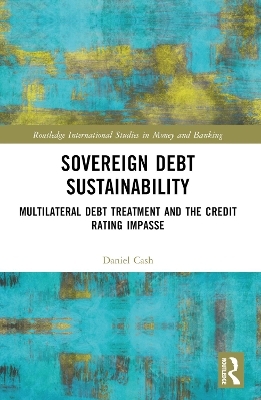
Sovereign Debt Sustainability
Multilateral Debt Treatment and the Credit Rating Impasse
Seiten
2024
Routledge (Verlag)
978-1-032-19866-8 (ISBN)
Routledge (Verlag)
978-1-032-19866-8 (ISBN)
Explains that the reason for the failure of recent initiatives to alleviate the poorest countries’ debt-related issues is an inability to bring sovereign countries to the table to re-negotiate their debt agreements with private creditors, as they fear the credit rating agencies and the prospect of a downgrade: the ‘Credit Ratings impasse’.
In 2020, the G20 proposed a solution for the debt-related issues affecting the world’s poorest countries due to the COVID-19 pandemic. However, their initiatives have failed to meet their objectives. The author argues that the reason for this failure is the inability to bring sovereign countries to the table to re-negotiate their debt agreements with private creditors as they fear credit rating agencies and the prospect of a downgrade. The author refers to this as the ‘credit rating impasse’.
This book proposes a novel solution. The author asserts that there is a need in the literature to unpick the dynamic that exists and creates that impasse, namely the pressures that exist between sovereign states, private creditors, credit rating agencies, and the geo-political backdrop that is massively influential in the dynamic, that is, the adversarial relationship between China and the US.
This book addresses the recent history of debt treatment for poorer countries and related successes and failures: COVID-19-related issues and the development of the Debt Service Suspension Initiative and the Common Framework for Debt Treatment. This book examines the reasons for their failure by analysing the positions of the sovereign states, the division between private and official creditors and between multilateral institutions such as the IMF and the World Bank, credit rating agencies, and the competing political entities of China and the US. It presents a wider picture of the systemic underpinnings to such debt-related issues and, when examined through a geo-political perspective, the subsequent chances of future debt treatment-related successes.
Licence line: The Open Access version of this book, available at www.taylorfrancis.com, has been made available under a Creative Commons Attribution-Non Commercial-No Derivatives 4.0 license.
In 2020, the G20 proposed a solution for the debt-related issues affecting the world’s poorest countries due to the COVID-19 pandemic. However, their initiatives have failed to meet their objectives. The author argues that the reason for this failure is the inability to bring sovereign countries to the table to re-negotiate their debt agreements with private creditors as they fear credit rating agencies and the prospect of a downgrade. The author refers to this as the ‘credit rating impasse’.
This book proposes a novel solution. The author asserts that there is a need in the literature to unpick the dynamic that exists and creates that impasse, namely the pressures that exist between sovereign states, private creditors, credit rating agencies, and the geo-political backdrop that is massively influential in the dynamic, that is, the adversarial relationship between China and the US.
This book addresses the recent history of debt treatment for poorer countries and related successes and failures: COVID-19-related issues and the development of the Debt Service Suspension Initiative and the Common Framework for Debt Treatment. This book examines the reasons for their failure by analysing the positions of the sovereign states, the division between private and official creditors and between multilateral institutions such as the IMF and the World Bank, credit rating agencies, and the competing political entities of China and the US. It presents a wider picture of the systemic underpinnings to such debt-related issues and, when examined through a geo-political perspective, the subsequent chances of future debt treatment-related successes.
Licence line: The Open Access version of this book, available at www.taylorfrancis.com, has been made available under a Creative Commons Attribution-Non Commercial-No Derivatives 4.0 license.
Daniel Cash is a Senior Lecturer at Aston University, UK, a Fulbright Scholar at New York University’s Stern Business School, and specialises in the regulation of the credit rating industry.
Introduction 1. A Modern History of Debt Treatment for African Countries 2. The Impact of the Covid-19 pandemic 3. The DSSI, The Common Framework, and the Credit Rating Impasse 4. Resolving the Credit Rating Impasse: Part One 5. Resolving the Credit Rating Impasse: Part Two 6. The Future for Africa Conclusion
| Erscheinungsdatum | 05.10.2022 |
|---|---|
| Reihe/Serie | Routledge International Studies in Money and Banking |
| Zusatzinfo | 5 Line drawings, black and white; 5 Illustrations, black and white |
| Verlagsort | London |
| Sprache | englisch |
| Maße | 156 x 234 mm |
| Gewicht | 453 g |
| Themenwelt | Wirtschaft ► Betriebswirtschaft / Management ► Finanzierung |
| Betriebswirtschaft / Management ► Spezielle Betriebswirtschaftslehre ► Bankbetriebslehre | |
| Wirtschaft ► Betriebswirtschaft / Management ► Unternehmensführung / Management | |
| Wirtschaft ► Volkswirtschaftslehre ► Makroökonomie | |
| ISBN-10 | 1-032-19866-4 / 1032198664 |
| ISBN-13 | 978-1-032-19866-8 / 9781032198668 |
| Zustand | Neuware |
| Haben Sie eine Frage zum Produkt? |
Mehr entdecken
aus dem Bereich
aus dem Bereich
warum unser Geld stirbt und wie Sie davon profitieren
Buch | Hardcover (2024)
FinanzBuch (Verlag)
CHF 41,95
denken und handeln wie ein professioneller Trader
Buch | Softcover (2023)
Vahlen, Franz (Verlag)
CHF 51,65


